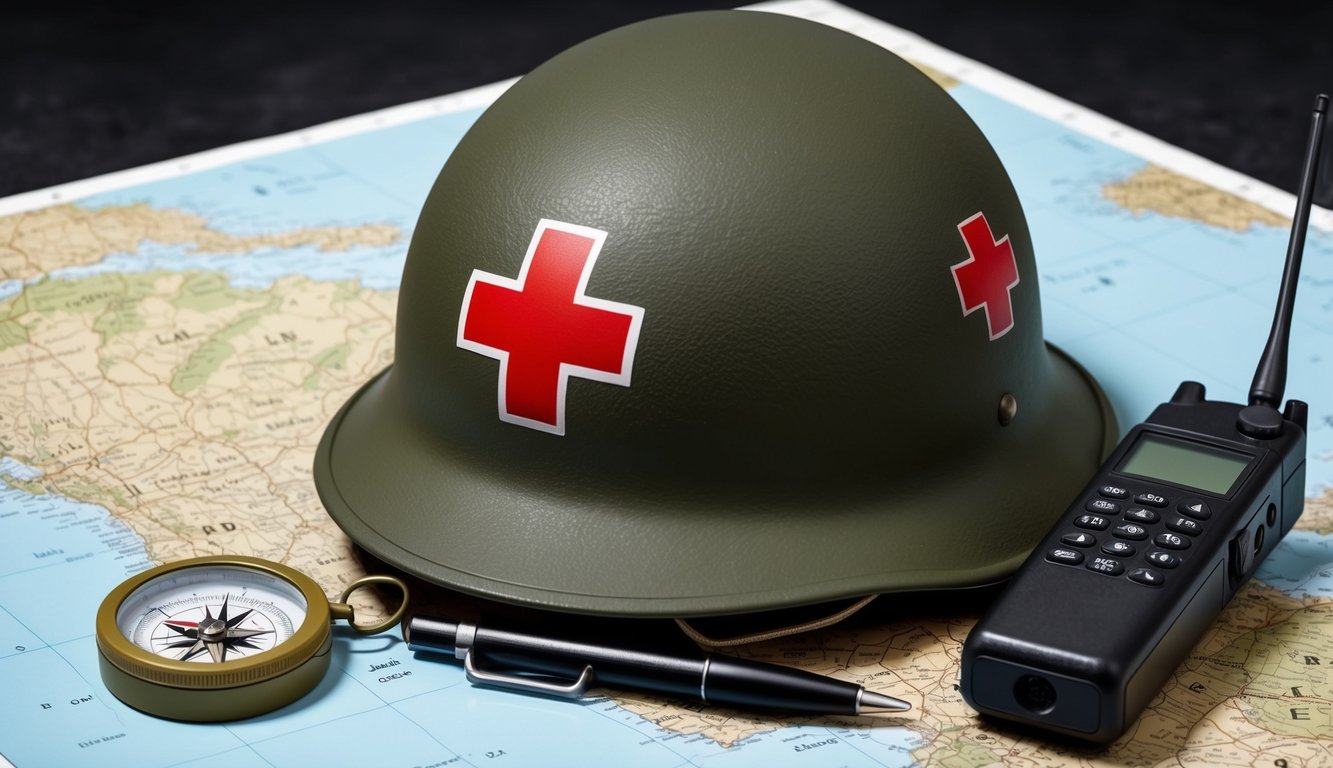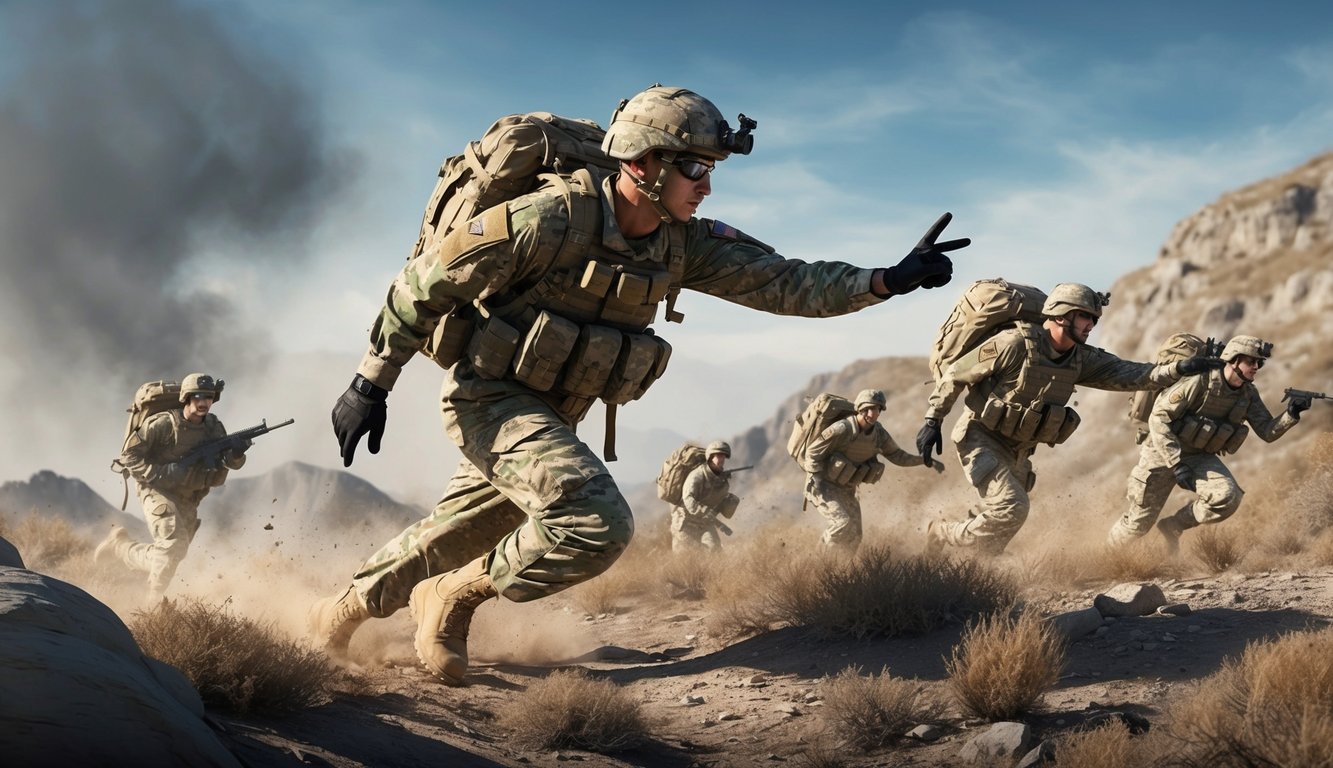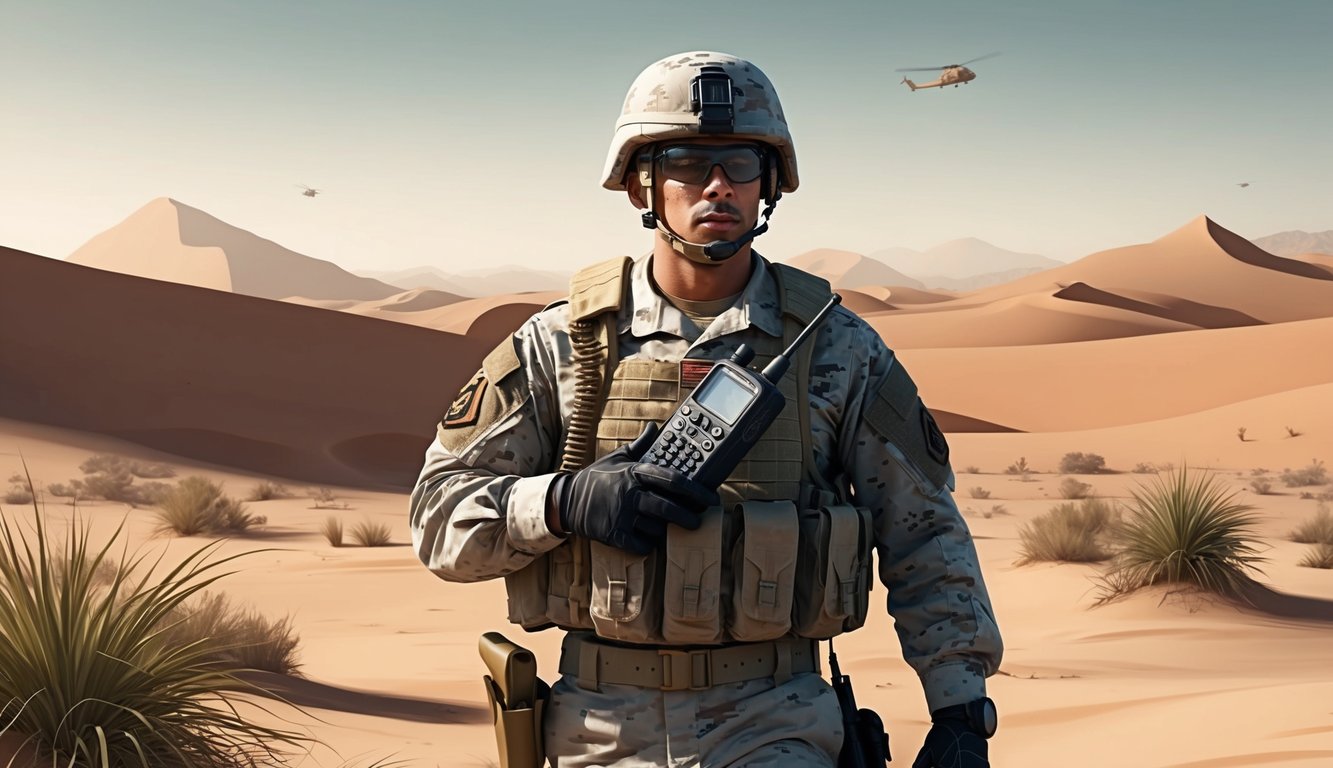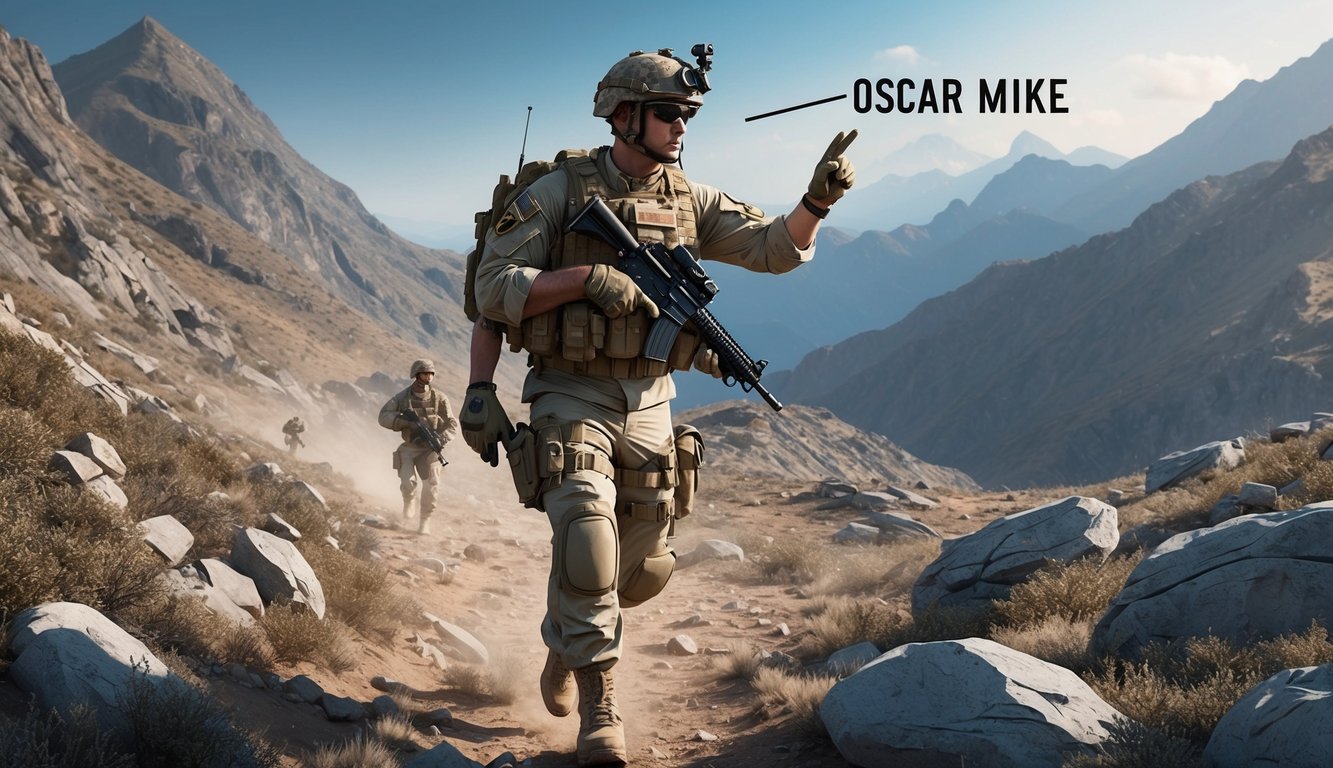Have you ever pondered the significance of “Oscar Mike”? This military slang has surged in popularity recently, appearing in video games, films, and casual conversations. “Oscar Mike” refers to military jargon for “on the move” or “on mission.”
It offers a quick and efficient means for troops to convey their status during operations.
The term “Oscar Mike” derives from the military phonetic alphabet, where “Oscar” stands for the letter O and “Mike” for M. This system enhances clear communication in noisy or chaotic conditions, minimizing the risk of misunderstandings that can be critical in high-pressure scenarios.
Despite its simplicity, “Oscar Mike” carries great importance in military contexts.
It signals to team members that a unit is mobile and actively pursuing its objectives.
This concise phrase encapsulates the swift, focused nature of military missions and the necessity of clear and effective communication in the field.
Key Takeaways
- “Oscar Mike” signifies “on the move” or “on mission.”
- It originates from the phonetic alphabet for efficient communication.
- Familiarity with military jargon like “Oscar Mike” can provide insight into operational dynamics.
Decoding ‘Oscar Mike’: A Brief Overview
Heard the term “Oscar Mike” and wondered what it signifies? You’re not alone! This military jargon has found its way into civilian conversations as well.
“Oscar Mike” translates to “on the move” in military speak.
It’s a concise and efficient way for soldiers to express that they’re repositioning or setting out.
Originating from the military phonetic alphabet, “O” is represented by “Oscar” and “M” by “Mike”.
This phonetic system ensures clear communication in noisy or chaotic settings.
You might encounter “Oscar Mike” used in radio communications or during operations.
It succinctly conveys “We’re moving out,” conserving time and reducing the risk of misunderstandings.
Originally a military term, “Oscar Mike” is now seen in video games, movies, and casual dialogue, showcasing how military expressions can infiltrate everyday language.
Next time you’re heading out with friends, consider tossing “Oscar Mike” into conversation! Just be ready to clarify its meaning!
Understanding the Military Phonetic Alphabet
The military phonetic alphabet originated from the need for clear wartime communication.
It evolved from early standardization efforts into a globally recognized system for clear verbal exchanges.
World War II and the Development of the Phonetic Alphabet
During World War II, the demand for precise communications became paramount.
The Royal Air Force introduced the RAF phonetic alphabet in 1924, influencing military communications.
In 1941, the US military standardized its own version across all branches.
This wartime alphabet included words like Able, Baker, and Charlie, helping to eliminate confusion where clarity was vital.
Pilots, naval officers, and ground troops relied on it to convey critical information accurately.
NATO Standardization and Global Use
In 1956, NATO introduced a revised phonetic alphabet, replacing the World War II version with words that are more internationally recognizable.
You may be familiar with terms such as Alpha, Bravo, and Charlie from this system.
NATO’s version quickly became the standard for military and aviation use across the globe, designed to be understood regardless of language or accent.
Today, it is utilized in various fields beyond the military, including emergency services and civilian aviation.
The NATO phonetic alphabet continues to evolve, with minor updates made to enhance its efficacy in modern communication contexts.
Comprehending Military Jargon
Military communication is heavily reliant on specialized language and codes.
These terms and phrases facilitate clear and efficient exchanges in high-pressure environments.
Military Slang and Code Words
Military jargon serves an essential purpose in armed forces.
You’ll frequently hear terms like “Oscar Mike,” denoting “on the move” or “on mission.” This shorthand enables quick and precise communication.
Code words can also obscure sensitive information.
For instance, “Whiskey Foxtrot” might replace “WTF” to express confusion or surprise discreetly.
Military slang continually evolves, with new terms arising to describe unique experiences or equipment.
Familiarity with this language can offer deeper insights into military culture and operations.
Radio Communications in the Military
Radio remains a crucial tool for military communications, with stringent protocols established to preserve clarity and security on the airwaves.
The phonetic alphabet (Alpha, Bravo, Charlie, etc.) assists in preventing misunderstandings, especially when spelling out names or locations.
Brevity codes condense intricate messages into succinct phrases, saving time and minimizing the risk of interception.
Clear speech and adherence to radio etiquette are vital.
Communicators must be articulate, utilize standard phrases, and follow established guidelines to ensure accurate message delivery.
The Importance of ‘Oscar Mike’ in Missions

“Oscar Mike” plays an essential role in military missions, promoting coordination and efficiency.
It signifies readiness for action and keeps team members informed about movement status.
Movement and Readiness
When “Oscar Mike” is conveyed during a mission, it indicates your team is advancing.
This phrase signals everyone should be primed for action.
It’s a swift way to indicate that the mission is transitioning from one phase to another.
“Oscar Mike” also conveys readiness.
If a squad leader announces this phrase, all team members must be alert and prepared to mobilize at a moment’s notice.
This creates urgency and ensures that every team member remains synchronized.
In fast-paced combat situations, “Oscar Mike” helps keep you informed about your unit’s status.
If separated, hearing this over the radio reassures you that your team is mobile and actively pursuing mission objectives.
Efficiency in Communication
The use of “Oscar Mike” significantly reduces communication time.
Instead of saying, “We’re moving to the next location,” one can simply say “Oscar Mike,” conveying the same message much quicker.
This efficiency is critical in high-stress scenarios where every second counts.
Utilizing this shorthand frees up radio channels for other essential communications.
It also mitigates the risk of miscommunication, as “Oscar Mike” carries a clear, universally understood meaning within military circles.
When in transit, using “Oscar Mike” aids in preserving operational security.
It discreetly communicates your status without disclosing specific details about your location or destination to potential eavesdroppers.
Exploring ‘Oscar Mike’ Further

“Oscar Mike” transcends a simple military phrase; it embodies substantial meaning in operational contexts and has permeated popular culture.
Real-Life Application in Military Settings
Within the US Armed Forces, “Oscar Mike” serves as a vital communication tool.
In the field, prompt and clear messaging can be crucial.
Imagine being part of a unit that needs to act quickly.
Your commander might radio, “We’re Oscar Mike in five.” You immediately understand it’s time to mobilize and prepare for departure.
This term aids in upholding operational security.
Instead of stating “We’re moving,” which could be intercepted, “Oscar Mike” adds an element of code.
It’s especially valuable in situations where radio communications need to be succinct and discreet.
Cultural Impact Beyond the Military
Even if you’re not in the military, you’ve likely come across “Oscar Mike.” It’s prominently featured in video games, particularly the Call of Duty franchise.
During gameplay, characters might use the phrase during missions.
Military-themed TV shows and movies often incorporate “Oscar Mike” for authenticity, leading to its adoption in everyday speech.
Casual conversations may include phrases like “Let’s go Oscar Mike” when it’s time to exit a gathering.
The term has also inspired brand identities.
Numerous veteran-owned businesses feature “Oscar Mike” in their names or slogans, connecting their products to military culture and values.
Additional Military Terms and Phrases
Military communication is rich with unique terminology and shorthand, facilitating quick and clear information exchange in high-pressure situations.
Charlie Mike and Related Acronyms
Charlie Mike translates to “continue mission.” This phrase often encourages troops to persist.
Tango Mike means “thanks much,” serving as a gesture of appreciation.
Bravo Zulu signifies “good job” or “well done.”
Lima Charlie stands for “loud and clear,” confirming effective radio communication.
Whiskey Tango Foxtrot (WTF) conveys confusion or disbelief, while Tango Uniform means “toes up”—a euphemism for someone who has passed away.
These acronyms use the NATO phonetic alphabet, where each letter corresponds to a word, helping to avert misunderstandings in noisy settings.
Acknowledgment and Response Protocols
“Roger” is a common acknowledgment, meaning “received and understood.” “Wilco” is short for “will comply.”
“Say again” requests repetition of a message. “Over” marks the end of a transmission, while “out” indicates the end of a conversation.
“Mayday” serves as an international distress signal, while “pan-pan” is used for less urgent matters.
These standardized responses ensure effective communication across various military branches and between allied forces.
Variations and Advanced Concepts

“Oscar Mike” has evolved beyond its basic definition, acquiring varied applications in different contexts.
Its usage differs between military personnel and civilians, with subtle distinctions in interpretation and implementation.
Modifiers and Contextual Usage
You might encounter “Oscar Mike” with modifiers that provide specificity.
For instance, “Oscar Mike Alpha” could indicate movement to a particular location, while “Oscar Mike Bravo” might suggest an alternate destination.
In urgent scenarios, you may hear “Hard Oscar Mike,” emphasizing swift movement.
In a combat situation, “Oscar Mike” might include additional context.
Saying “Oscar Mike to extract” indicates movement towards an extraction point, while “Oscar Mike with wounded” notifies of a team escorting injured personnel.
Civilians have also adopted variations.
It’s common to hear someone say they’re “Oscar Mike to the store” or “Oscar Mike home,” reflecting the phrase’s integration into everyday conversation.
Nuances in Military and Civilian Communication
In military contexts, “Oscar Mike” conveys determination and commitment.
When spoken by a soldier, it signals more than just movement; it reflects mission focus and unity.
For civilians, the phrase often loses its urgency.
You’ll encounter it playfully among friends, perhaps saying “Let’s go Oscar Mike” when suggesting it’s time to leave.
However, some civilian organizations, like emergency services, may employ it more seriously.
Your interpretation of “Oscar Mike” can vary based on your background.
Military members associate it with duty and resilience, while civilians might see it as a trendy way to say “on the move” without grasping its full significance.
Frequently Asked Questions

The military phrase “Oscar Mike” has piqued the curiosity of many outside the armed forces.
Let’s address some common questions regarding its meaning, usage, and relevance in military communication.
Why do they use ‘Oscar Mike’ in the military?
Military members utilize “Oscar Mike” as a shorthand to indicate movement.
It’s derived from the phonetic alphabet, where “Oscar” represents “O” and “Mike” signifies “M.” Together, they mean “On the Move.”
What does ‘Oscar Mike Foxtrot’ indicate?
“Oscar Mike Foxtrot” combines two phonetic phrases. “Oscar Mike” means “On the Move,” while “Foxtrot” stands for “F.” This phrase isn’t a formal military term but could informally suggest “On the Move, F***.”
Can you elaborate on the origins of ‘Oscar Mike’?
The term originated from the NATO phonetic alphabet, developed in the 1950s.
It was created to standardize communication across military factions to prevent misunderstandings during radio transmissions. “Oscar Mike” became a succinct way to express movement or mission status.
How should one respond when someone says ‘Oscar Mike’?
There is no specific “correct” response to “Oscar Mike.” It’s primarily an informational phrase.
You might acknowledge with “Roger” or “Copy that” if part of the operation.
If you are also moving, you could reply with “Oscar Mike” in kind.
In what context is ‘Oscar Mike’ used in military communication?
During military operations, “Oscar Mike” functions as a swift status update.
It informs others that a unit is mobilizing or initiating a mission.
This brevity code helps maintain efficient communication in fast-paced environments.
What does it imply to see ‘Oscar Mike’ on a Jeep?
Observing “Oscar Mike” on a Jeep likely signifies the owner’s military affiliation.
It may express pride in service or an appreciation for military culture.
The phrase displayed on a vehicle represents readiness and mobility—core military values.

